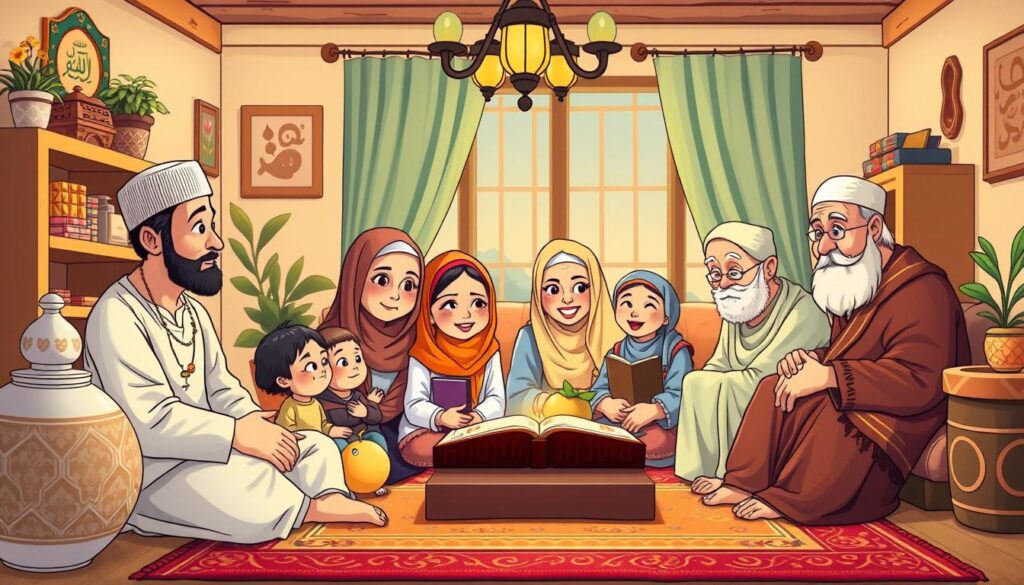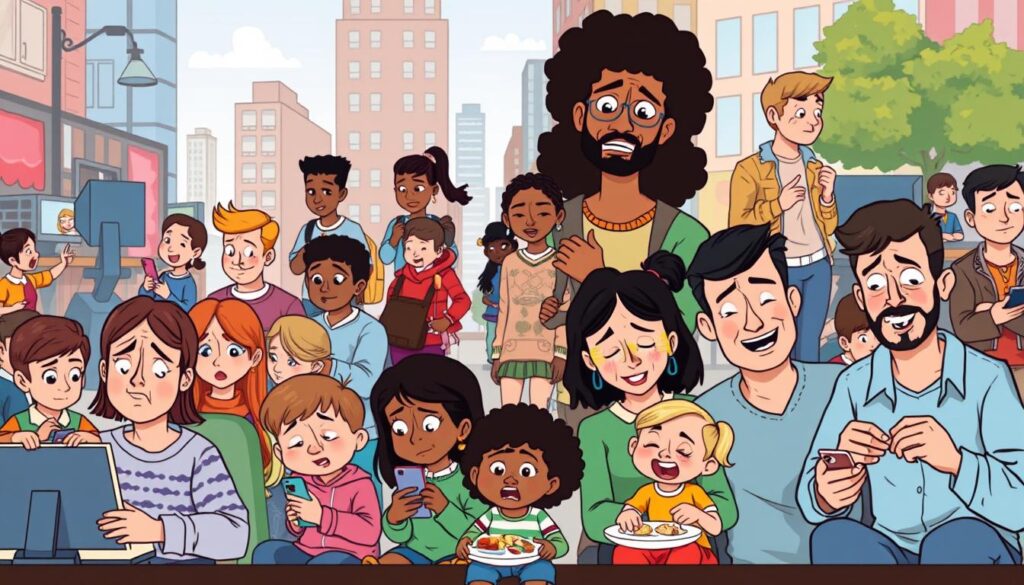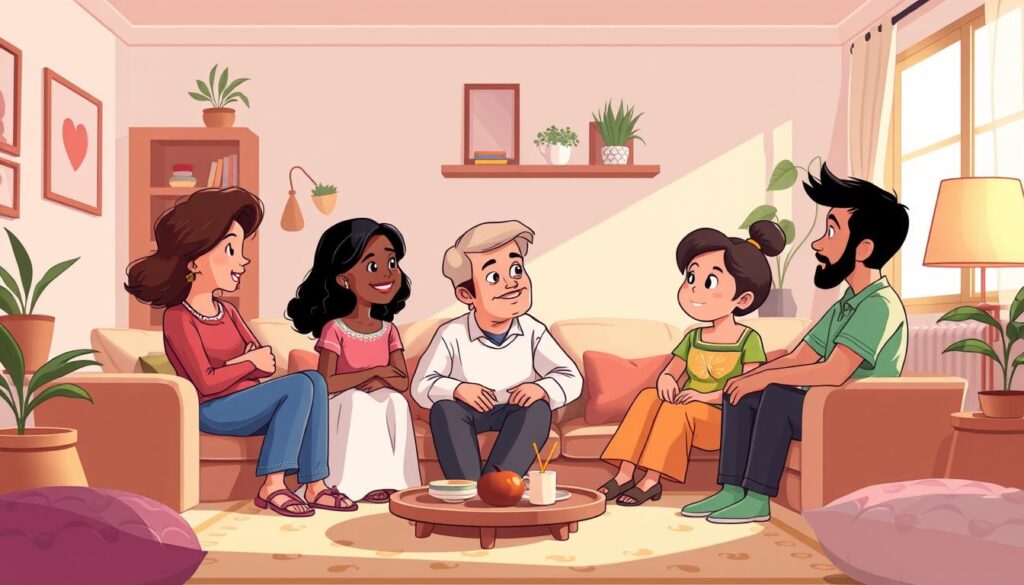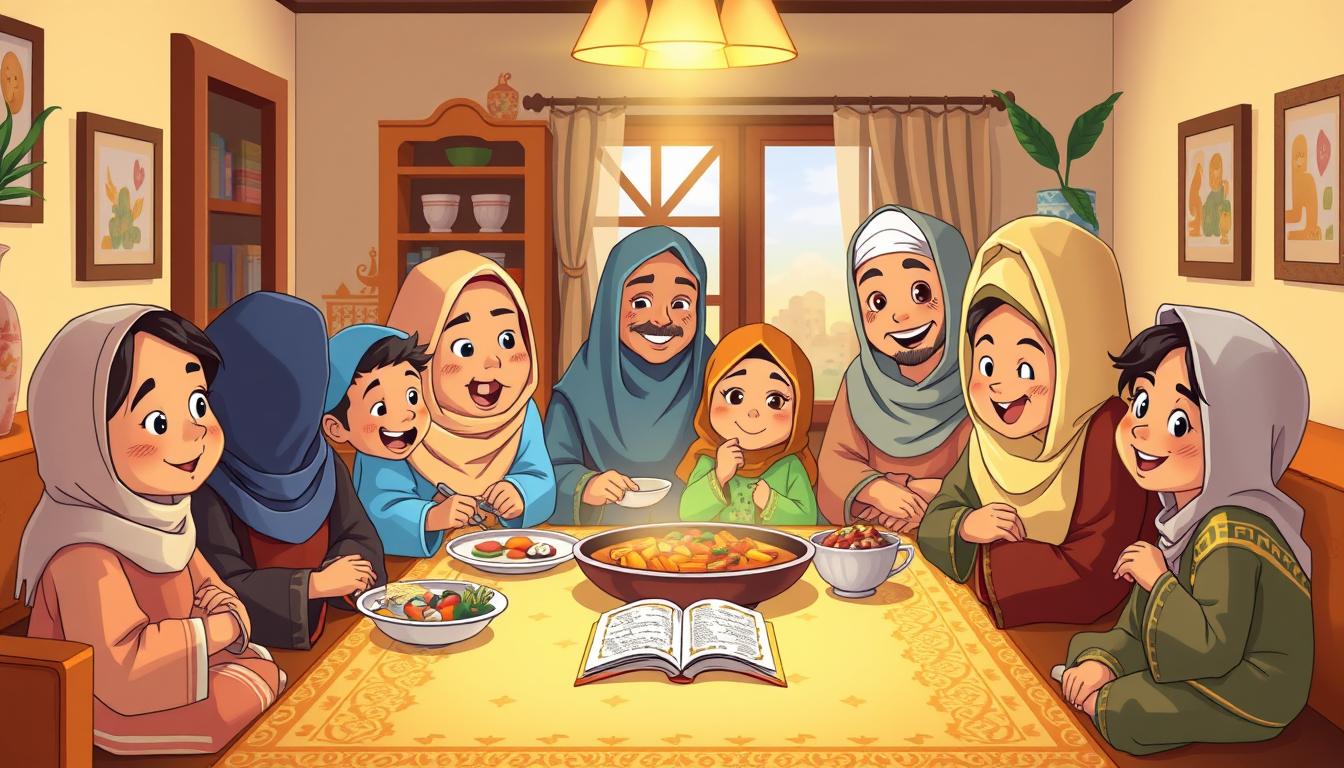The role of families in Islam is vital. It focuses on personal and community health. Families aren’t just social groups in Islam; they’re built on love, compassion, and support. By following Islamic family values, we create places where all can grow in faith and friendship.
Families help create strong communities. They pass on knowledge, culture, and faith to the next generations. This article looks at the crucial role families play in Islam. We’ll see how they help make communities stronger and more united. Let’s celebrate the importance of family life and its impact on our faith-driven lives.
Key Takeaways
- Family serves as a cornerstone of well-being in Islamic teachings.
- Islam prioritizes love and compassion within family structures.
- Family roles are critical for passing down knowledge and cultural heritage.
- Supportive families foster positive identities and faith among members.
- Strong family bonds lead to resilient communities and decreased conflicts.
Importance of Family in Islamic Teachings
Islam teaches us the deep value of family in our lives and how we interact with others. It sees the family as vital for personal and community health. Through the Quran and Hadith, we learn about family roles and values.
Family helps grow love, trust, and spirituality. These are key values in Islamic communities.
Quranic References to Family Values
The Quran teaches us about family roles and duties. It talks about love and kindness between spouses. This partnership helps raise children and keeps peace at home.
The idea of *usra*, or family, stands for unity and safety. It creates a caring place for everyone. Islam teaches us to keep family bonds strong, as it’s both social and spiritual duty.
Teachings of the Prophet Muhammad on Family
The Prophet Muhammad showed the importance of family relationships. He taught kindness even to distant relatives. He said keeping family ties is very important.
He saw family values as respect, support, and understanding. Marriage, he taught, protects against wrong actions. Strong family ties keep our society moral.
Significance of Kinship in Islam
Kinship is sacred in Islam. The Quran tells us that helping family is a great act of charity. Our relatives support us in many ways. They help with our upbringing, emotional health, and duty to society.
Keeping close with family helps us grow as individuals and strengthens society. This shows how crucial family is in Islam.
The Structure of an Islamic Family
The family structure in Islam is deep and covers more than just parents and kids. It includes extended family, too. This setup is based on everyone helping each other, which brings unity and stability. It helps build strong connections, understanding, and faith-based living.
Roles of Parents in the Family Unit
Parenting in Islam is a big job. Parents are the main caregivers and teachers for their kids. They work hard to:
- Take care of the physical and emotional needs of their kids.
- Pass on Islamic values to grow the family’s moral foundation.
- Choose good partners for their children to ensure the family’s future stability.
- Support their children’s growth for over fifteen years.
Parenting plays a key role in creating valuable members of the community.
Importance of Sibling Relationships
Siblings are an important part of family life in Islam. They share experiences, give emotional support, and become lifelong friends. Studies show that:
- About 75% of Muslim youth feel very connected to their families.
- Good relationships between siblings reduce conflicts and make the family stronger.
- Helping each other in tough times makes siblings more resilient.
Extended Family Dynamics in Islam
The extended family is crucial in Islam, offering support and guidance. Many Muslims talk to distant relatives often, creating a community feel. It’s been found that:
- Above 65% of Muslims stay in regular touch with their extended family.
- In half of the Muslim households, grandparents play a daily role, adding wisdom.
- Family traditions are key in keeping the culture alive, especially during religious holidays.

Family as a Source of Spiritual Support
In the Islamic tradition, families are key to providing spiritual support. They build a spiritual base through shared religious activities, strengthening family bonds in Islam. This shared faith greatly helps everyone’s emotional health.
Nurturing Faith Through Family Practices
Daily prayers and reading the Quran together help grow a family’s spiritual life. Studies show that families focused on faith have fewer mental health issues in their kids. This routine helps kids connect deeply with their faith.
Family Gatherings for Worship
Community worship brings family members and the Muslim community closer. About 78% of Muslim families feel supported by these gatherings during tough times. These moments not only unify families but also build a network of support.
Encouraging Islamic Learning at Home
Teaching Islam at home is crucial in a family. Parents are key in passing on their values and faith, preparing kids for their spiritual paths. Research indicates that 64% of kids from faith-focused homes stay connected to their religion as adults. This not only strengthens family ties in Islam but also ensures the faith passes on to future generations.
| Research Findings | Percentage |
|---|---|
| Individuals reporting stronger belonging in believing families | 67% |
| Higher family satisfaction in shared religious practices | 35% |
| Families finding comfort in community during crises | 78% |
| Lower mental health challenges among faith-focused families | 72% |
| Children maintaining religious affiliations into adulthood | 64% |
Responsibilities of Family Members
In Islam, families are the foundation of society. They have defined roles that create support and harmony. Everyone in the family has an important role that helps them grow morally, feeling a strong sense of purpose and belonging.
Parents’ Responsibilities in Islam
Being a parent in Islam is taken very seriously. They are responsible for guiding their children morally and spiritually. This includes teaching them about Islam, as mentioned in the Quran, and making sure they pray from a young age. Parents must lead by showing good Islamic values themselves.
Children’s Duties towards Parents
Children also have important duties. The Quran tells them to respect and care for their parents, especially when they get older. Kindness and obedience are key. By doing this, children make a loving and respectful home that brings everyone closer.
The Role of Extended Family in Support
Extended family members play a big role too. They help raise and guide the kids, adding more support. In Muslim cultures, having the extended family close strengthens the community’s spirit of togetherness. This ensures that everyone supports each other, as Islam teaches.
| Family Member | Responsibilities |
|---|---|
| Parents | Guidance, moral education, care, and instilling Islamic values |
| Children | Respect, support, and caring for aging parents |
| Extended Family | Providing support and contributing to the education and upbringing of children |
The Impact of Strong Families on Society
Strong families are key to building strong communities. They create social ties that make communities better. Unity and good values in families help society grow. The values of family unity in Islam make communities strong and healthy.
Families as Building Blocks of Communities
The strength of a society links to its families. Strong families make strong communities. But, broken families can hurt society. Families following Islamic teachings help solve social problems. They show how important family unity in Islam is for community support.
- Promotion of shared values
- Emphasis on social responsibility
- Encouragement of community involvement
- Support for individual well-being
Promoting Social Justice through Family Values
In Islam, family values are important for society’s welfare and progress. Families that value justice, kindness, and respect help address social issues. They work against problems like divorce and drug abuse. This shows how families can build a fair world for everyone.
The Influence of Strong Families on Youth
Stable families positively affect young people. They grow up to be community-minded adults. Strong families teach kids to be involved in their communities. Benefits for youth from strong family environments include:
- Improved mental health and emotional well-being
- Access to education and resources
- Stronger social networks
- Positive role models
Strong family bonds improve lives and help communities thrive. Family unity in Islam guides us towards a successful and stable society.
| Family Strength Indicators | Societal Effects |
|---|---|
| Cohesion and trust among family members | Lower crime rates |
| Support for educational growth | Higher academic achievement |
| Promoting ethical values | Increased social responsibility |
| Encouraging community service | Stronger community bonds |
Family Challenges in the Modern World
Today’s families face more challenges than ever in our complex world. We’re torn between keeping our traditions and embracing new ways, especially where individualism and materialism can overshadow Islamic values. It’s vital to keep our family strong and make sure our children grow up with deep faith.
Balancing Tradition and Modernity
Keeping traditional values alive while adjusting to new societal norms is hard. In Western societies, Muslim families often struggle to keep their Islamic faith front and center. Material successes are tempting, but we must stress teaching our kids about Islam through our own actions.
Kids who see their parents practice their faith are more likely to follow. Being active in Islamic activities helps them connect more with their roots and understand Islamic teachings better.
Navigating Interfaith Marriages
Interfaith marriages come with their own set of challenges and require much understanding. Couples have to respect their different cultures and keep communication open. Focusing on what we share helps keep peace and unity.
By encouraging participation in community events and stressing Islamic values, families can stay close. Everyone feels respected and important, strengthening family bonds or silat ar-rahim.
Addressing Family Conflicts with Compassion
Conflict is normal in families, but dealing with it compassionately is key. Talking issues out gently and spending time together reduces fights. Islamic teachings guide us to solve problems with kindness and respect.
Following Allah’s path in all our family dealings brings everyone together. It creates a loving and supportive home environment.

The idea of what makes a family is and puts our values to the test. By working together and staying consistent, we can help our families and communities thrive, even during tough times.
Celebrating Family Milestones in Islam
Celebrating family milestones in Islam strengthens bonds and deepens cultural identity. Events like birth, marriage, and death offer chances for community support. They help us understand family and marriage in Islamic culture.
Importance of Birth and Naming Ceremonies
Aqiqah and similar ceremonies celebrate a new life. They bring family and friends together. It shows the start of community support for the child’s life.
This act makes family ties stronger. The newborn is welcomed warmly. Everyone supports them from the start.
Marriage and Its Significance in Islam
Marriage is a key part of Islam that unites families. About 80% of marriages are arranged. This underlines the cultural importance of weddings in Islam.
The ceremonies show respect and shared duties. They commit families to work together. Clear and respectful talk between spouses is key. It keeps Islamic values strong.
Observing Death and Mourning Practices
Death traditions in Islam bring families closer during sad times. Mourning, including the Janazah prayer, helps everyone reflect and support each other. It underlines the strength of family ties.
These customs help families through their loss. They remember and honor those who have passed. It’s a healing process for them.
| Milestone | Significance | Community Involvement |
|---|---|---|
| Birth Ceremonies | Gratitude expression and community bonding | Family and community gatherings |
| Marriage | Strengthening family ties and responsibilities | Involvement of extended relatives |
| Death and Mourning | Unity and support during grief | Joint prayers and remembrance |
Islamic Guidance on Family Communication
Good communication is key to strong family bonds in Islam. It teaches us to be clear, honest, and positive with each other. This makes every family member feel important and listened to. Islam gives us ways to solve conflicts with kindness and patience, making families tighter.
Effective Communication Strategies
Islam teaches us to always speak truthfully and nicely. It advises us to use words that are respectful and easy to understand. This helps keep conversations positive and meaningful.
- Qaulan Sadida: Speaking the truth with sincerity.
- Qaulan Ma’rufa: Using kind words that uplift and comfort.
- Qaulan Baligha: Ensuring clarity and directness in communication.
- Qaulan Maysura: Employing simple language for better understanding.
- Qaulan Layyina: Speaking gently, creating a warm atmosphere.
- Qaulan Kari ma: Choosing words that are respectful and considerate.
Conflict Resolution in Families
Kindness and manners are highly valued in Islam, especially when fixing family disagreements. The Prophet Muhammad (p.b.u.h) taught us to be the nicest to our family. Islam suggests mediation to solve problems, so everyone feels heard. This helps us understand better and argue less.
Encouraging Honesty and Openness
Being open and honest makes a family trust each other more. Parents should be good role models because kids often do what they see. A caring home teaches everyone to be kind and responsible. Islam guides us to make sure our loved ones are okay. By talking truly and kindly, we can keep our family connected.

| Value | Description |
|---|---|
| Qaulan Sadida | Speaking the truth with sincerity |
| Qaulan Ma’rufa | Using kind and uplifting words |
| Qaulan Baligha | Ensuring clarity in communication |
| Qaulan Maysura | Employing simple and understandable language |
| Qaulan Layyina | Speaking gently to create a warm atmosphere |
| Qaulan Kari ma | Choosing respectful and considerate words |
Community Support for Families
Community support is very important to help families grow in a faith-filled atmosphere. Mosques play a big part in family life according to Islamic teachings. They offer spiritual growth and educational activities. By connecting families, mosques provide worship opportunities and support for each other.
Role of Mosques in Family Life
Mosques help bring families together. They offer programs for everyone in the family. These include:
- Community events at Eid that bring joy and unity.
- Sunday school classes for kids to learn Islamic values early on.
- Workshops for parents about building faith at home.
In Ramadan, mosques also hold iftars for everyone to share, bringing people closer.
Community Programs for Family Development
Programs for family growth are key to improving Muslim family lives. These programs cover:
| Program Type | Description | Examples |
|---|---|---|
| Educational Workshops | Lessons on parenting and Islamic ethics. | Parenting talks, Qur’an study circles. |
| Community Service Initiatives | Helping the needy, making families stronger. | Food drives, tutoring for refugees. |
| Support Networks | Helping families connect for encouragement. | Family days out, mentor programs. |
By joining these programs, families feel a stronger sense of community.
Networking Among Families for Mutual Support
The idea of ummah creates a sense of brotherhood. It encourages families to help and support each other. This support is crucial during tough times. Families coming together in difficult times show compassion and strength. Supporting each other like this highlights the importance of community.
When we help each other in the community, we not only help our families, but we also do our religious duty. To learn how connections can change lives, visit building a meaningful community.
Conclusion: Strengthening Families in Islam
Families are the foundation of our community in Islam. They are built on love, respect, and close bonds. This creates a nurturing setting for kids.
Nearly 75% of Muslim families focus on the power of love and support. This strong base preps the next generation for success. Following these teachings, we improve our family ties and grow spiritually.
Call to Action for Stronger Family Bonds
We call on every family member to work on strengthening their family ties in Islam. Doing religious activities together, like praying and celebrating holidays, brings us closer. It makes our family unit stronger.
A strong family provides crucial emotional and spiritual support. When we face hard times, this bond becomes even more important. Studies reveal that families following Islamic unity teachings get 60% more emotional support during challenges.
Final Thoughts on Family’s Role in Islam
Family responsibilities go beyond culture; they are a divine duty in Islam. By taking care of each other, like supporting older family members, we lift each other up. This helps our whole community.
Let’s aim to build a future where family bonds are cherished. Our combined efforts will lead to a brighter future that honors our faith.






